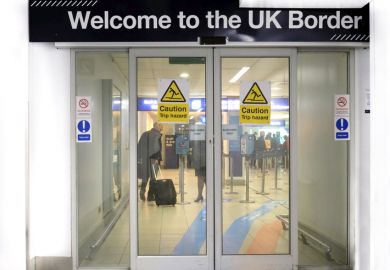International students applying to study in the UK have been facing difficulties proving they have enough money to support themselves, with the issue becoming a major driver of visa refusals, analysis suggests.
Immigration experts claim problems have arisen when the Home Office attempts to check with overseas banks in countries such as India and Nigeria, where rules state that students must prove they have sufficient funds.
Applicants are not subjected to such checks if they are British nationals overseas or from one of the 63 countries that have a “differentiation arrangement”, including English-speaking nations such as Australia and the US.
Analysis of student visa data shows that countries outside this list made up 53 per cent of study visa applications between 2020 and 2022, but 95 per cent of all refusals.
Over this period, 2.5 per cent of applications from countries that require extra checks were refused, compared with just 0.1 per cent from those that do not.
Of the five countries from which applications come for the most student visas – India, China, Nigeria, Pakistan and Bangladesh – only China has a differentiation agreement with the UK.
Esyllt Martin, an associate solicitor in employment and immigration at Eversheds Sutherland who discovered the discrepancy, said the high refusal rates might be down to other factors, but it was likely the issue arose when UK Visas and Immigration (UKVI) – a division of the Home Office – performed its checks with overseas banks.
“Whether lost in translation or in a labyrinth of contact details, this appears to be causing universities a lot of difficulties in getting international students the visas they need,” she said.
Government rules state that applicants must have £1,334 per month to support themselves for up to nine months for courses in London, and £1,023 for those elsewhere.
Applicants must also be able to prove they have extra money for each family member they bring with them.
“Even where the UK institution has worked closely with the applicant to ensure they provide all the right evidence of funds, if UKVI is unable to contact their bank to verify the document their visa will be refused,” added Ms Martin.
Given that 62 per cent of applicants in 2022 had to provide evidence of funds, this was a “hugely frustrating issue for the sector and is putting many institutions’ sponsor licences at risk”, she added.
It is understood that UKVI might decline a student’s application after unsuccessful attempts to contact their bank, though there are many possible reasons for a refusal.
The campaign group Unis Resist Border Controls (URBC) said the problems represented the “terrible ironies” of UK immigration policy and international students.
“The fact that migrant students from countries that require extra checks are refused student visas is related to the colonial relationships that make the UK a desirable destination, yet make the UK government suspicious of the very same countries from which it seeks to extract money by way of international tuition fees,” a URBC spokesperson said.
Analysis of countries with at least 100 applications within the Home Office data reveals huge disparities in success rates for visa applications.
Around 12 per cent of applications from Cameroon were refused in 2022, followed by 10 per cent from Ghana and 9 per cent from Zimbabwe – all of which require extra checks.
Around 1 per cent of applications from India were refused last year, which is on par with the average across all countries.
By contrast, none were refused from differentiated nationalities such as New Zealand, Norway and the Netherlands.
A government spokesperson said its points-based system was designed to be flexible according to the UK’s needs, including attracting top-class talent from across the world.
“We keep all our immigration policies under constant review to ensure they best serve the country and reflect the public’s priorities,” they said.
Register to continue
Why register?
- Registration is free and only takes a moment
- Once registered, you can read 3 articles a month
- Sign up for our newsletter
Subscribe
Or subscribe for unlimited access to:
- Unlimited access to news, views, insights & reviews
- Digital editions
- Digital access to THE’s university and college rankings analysis
Already registered or a current subscriber?








